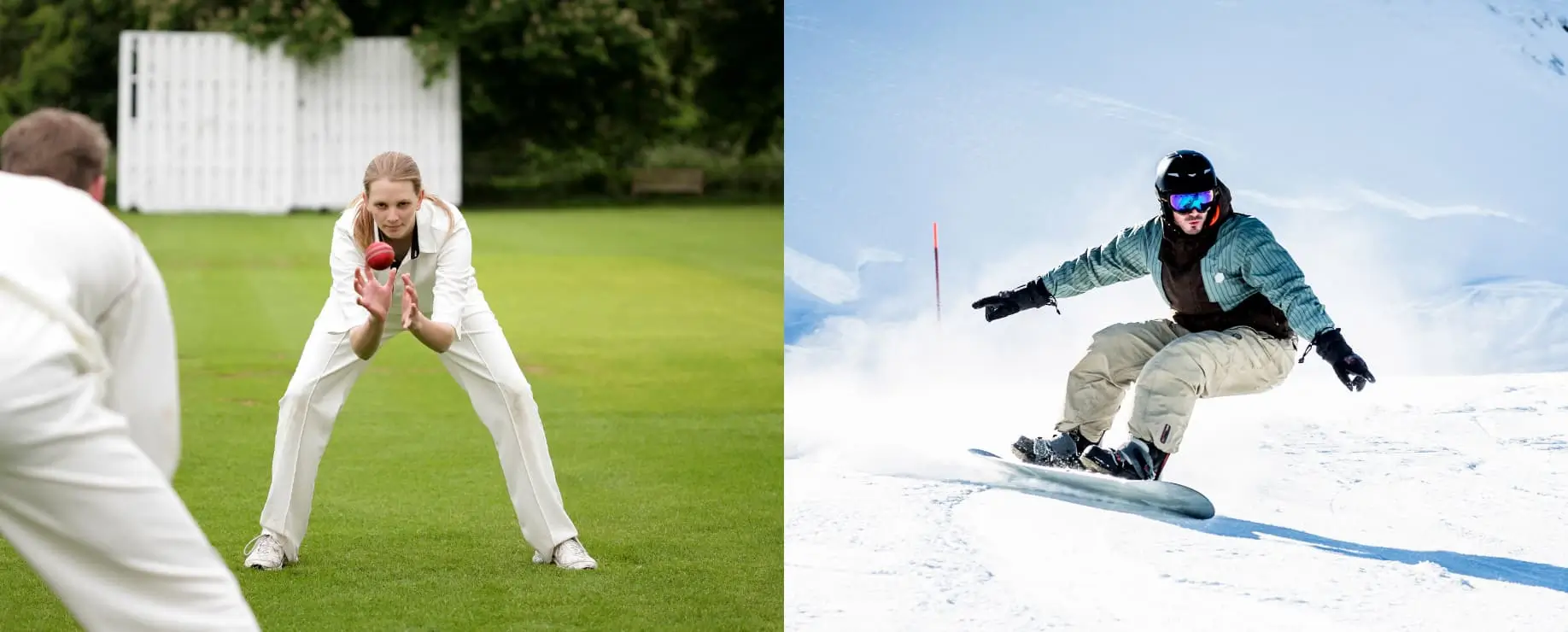Important note: The statements made in this paragraph about the cover provided by Flip Insurance for accidental injuries and the amount of benefits payable relate to the Flip Insurance products dated 27 June 2023.Those products were withdrawn and replaced with the new Flip Insurance products on 24 Sept 2025, which has a different scope of cover for accidental injuries. These statements do not describe the scope of cover under that new product. Please refer to the current Product Disclosure Statement for details of that cover.
Have you ever wondered what season you’re more likely to get injured? In this article, we'll look at injury trends, prevention and how Flip can protect you at home and away.
Seasonal injury trends
Whether you’re a summer or winter sports lover, you know that being active comes with a risk of injury. And the stats back it up. More people end up in hospital for winter sports like football and skiing during the colder months, and more people get injured from summer sports like cricket and surfing when it’s hot. But some sports like basketball aren’t affected by the seasons and keep a steady rate of hospitalisations all year round.
A report by the Australian Institute of Health and Welfare (AIHW) also reveals a rise in certain types of injuries over the summer months. Hospital admissions for transport-related injuries, weather-related injuries and drownings and submersion injuries all increase over the warmer months.
By contrast, the AIHW data showed that the common reasons for injury hospitalisations over the winter months include winter sports (such as AFL and soccer) and thermal-related causes (such as exposure to smoke, fire, and flames). Over half (52%) of all sports injury hospitalisations occurred over the colder months.
Sports injury trends
Whether you’re hitting the beach, the slopes, or the trails on your local or international adventures, you’re bound to have a blast. But you’re also exposed to the risk of injuries, some of which can be serious and costly. The AIHW’s tracking of injury hospitalisations uncovered some interesting trends for 2020-21:
- Admissions for males in particular show a rise during the winter sport season and a dip in the summer months.
- The winter sport of football (AFL, rugby and soccer combined) had the most injuries of all sports, with 14,800 hospitalisations.
- Snow sports resulted in 1,654 hospitalisations.
- Traditional summer sports like cricket, surfing, swimming and diving, boating, fishing and water skiing had 4,290 hospitalisations combined.
- Rugby has the highest rate of hospitalisation.
- 53% of sports injury hospitalisations were from fractures.
How to prevent injuries
No matter what season it is or what sport or activity you choose, you can take some steps to prevent injuries and protect yourself from their consequences. Here are some tips to follow:
- Warm up properly: Warming up before your activity will help prepare your muscles, joints, and cardiovascular system for physical stress.
- Wear the right gear: Appropriate clothing and protective equipment help avoid overheating, hypothermia, sunburn, dehydration and other issues.
- Follow the rules: Doing the right thing and staying within sensible limits will help keep you and others safe, avoiding mistakes, collisions and injuries.
- Know your limits: Listen to your body to prevent overexertion, fatigue and burnout. Rest, hydrate and seek medical attention if you have any concerns.
Protection in every season
Injury can strike any day of the year, and you never know when it might happen to you.
Flip Insurance gives you the peace of mind to enjoy your adventures knowing you’ve got cover for accidental injuries if something goes wrong.
Here’s how we helped on these recovery journeys:
- Casey* fell five metres from a ski lift and suffered a severe shoulder injury. He used his $2,600 cash payout to pay for medical bills, physio, rehab and Ubers.
- Nathan got a concussion on his first snowboarding trip in New Zealand. He used his $200 cash payout to cover on-mountain medical expenses.
- Jake copped a minor finger injury at his local rock climbing hangout. He used his $200 cash payout on a finger splint, Ubers and coffee and a comfort burger.
Cover at home or away
Whether you’re enjoying summer fun in Australia or heading to the northern hemisphere for some winter sports action, we hope you get out there and enjoy every moment.
Before you get stuck in, remember to check out Flip Active or Flip Kids for insurance covering accidental injuries in Australia and New Zealand or Flip Roaming for overseas cover.
* We have used a different name for this customer for privacy reasons.


